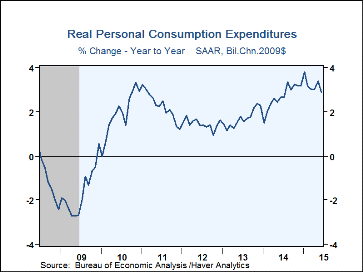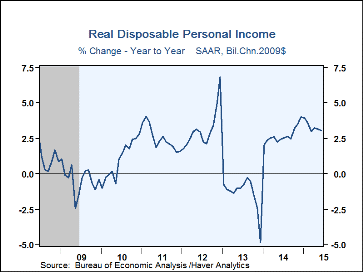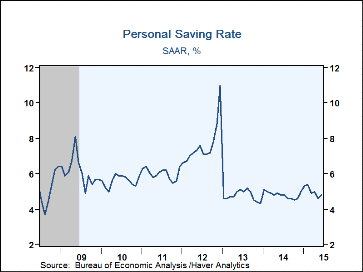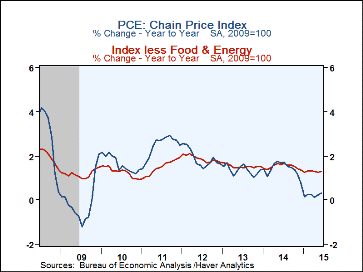 Global| Aug 03 2015
Global| Aug 03 2015U.S. Personal Spending Rise Moderates Despite Firmer Income Gain
by:Tom Moeller
|in:Economy in Brief
Summary
Personal consumption expenditures increased 0.2% during June following 0.7% and 0.3% gains during May and April, revised from 0.9% and 0.1%. The latest was the smallest rise since February and matched expectations in the Action [...]
Personal consumption expenditures increased 0.2% during June following 0.7% and 0.3% gains during May and April, revised from 0.9% and 0.1%. The latest was the smallest rise since February and matched expectations in the Action Economics Forecast Survey. Figures dating back through 2012 were revised. Adjusted for price inflation, personal spending eased minimally (+2.9% y/y) after 0.4% and 0.2% gains during the prior two months. Real durable goods purchases declined 1.1% (+4.5% y/y) after a 1.3% rise. Nondurable goods purchases in constant dollars fell slightly (+2.5% y/y) after a 0.9% jump and real services spending improved 0.2% (2.8% y/y) following a 0.1% uptick.
Personal income improved 0.4% (4.1% y/y) for the third straight month. A 0.3% increase had been expected. Wages & salaries gained 0.2% (4.1% y/y) following a 0.4% rise. Rental income jumped 1.1% (8.6% y/y) following similar gains during the prior two months. Proprietors income improved 0.8% (1.9% y/y) after a 0.5% rise. Social security payments fell 0.3% (+4.0% y/y), the first decline in nearly a year, while Medicare receipts gained 0.3% (3.3% y/y) for the fifth straight month. Unemployment insurance receipts surged 1.8% (-11.1% y/y). Interest income jumped 1.3% (1.9% y/y), strong for the third straight month, and dividend receipts gained 0.3% (5.3% y/y).
Disposable income increased 0.5% (3.4% y/y) after 0.4% gains during the prior two months. In real terms, disposable income rose 0.2% (3.0% y/y) after a 0.1% uptick. The three-month rate of change improved to 2.7%, its best since early this year.
The personal savings rate rose to 4.8% from 4.6%, revised from 5.1%. The rate was down from a February high of 5.4%. Personal saving increased 3.2% during the last twelve months.
The chain price index gained 0.2% (0.3% y/y) following a 0.3% rise. Energy prices jumped 1.8% (-15.9% y/y) while food prices improved 0.3% (1.0% y/y). Durable goods prices eased 0.2% (-2.0% y/y) but nondurable goods prices rose 0.4% (-3.0% y/y). Services prices increased 0.2% (1.9% y/y). The price index excluding food & energy notched 0.1% higher (1.3% y/y) for the third straight month.
The personal income & consumption figures are available in Haver's USECON database with detail in the USNA database. The consensus expectation figures are in the AS1REPNA database.
| Personal Income & Outlays (%) | Jun | May | Apr | Y/Y | 2014 | 2013 | 2012 |
|---|---|---|---|---|---|---|---|
| Personal Income | 0.4 | 0.4 | 0.4 | 4.1 | 4.4 | 1.1 | 5.0 |
| Wages & Salaries | 0.2 | 0.4 | 0.2 | 4.1 | 5.1 | 2.7 | 4.5 |
| Disposable Personal Income | 0.5 | 0.4 | 0.4 | 3.4 | 4.2 | -0.1 | 5.1 |
| Personal Consumption Expenditures | 0.2 | 0.7 | 0.3 | 3.2 | 4.2 | 3.1 | 3.4 |
| Personal Saving Rate | 4.8 | 4.6 | 5.0 | 4.8 (June '14) |
4.8 | 4.8 | 7.6 |
| PCE Chain Price Index | 0.2 | 0.3 | 0.0 | 0.3 | 1.4 | 1.4 | 1.9 |
| Less Food & Energy | 0.1 | 0.1 | 0.1 | 1.3 | 1.5 | 1.5 | 1.9 |
| Real Disposable Income | 0.2 | 0.1 | 0.3 | 3.0 | 2.7 | -1.4 | 3.1 |
| Real Personal Consumption Expenditures | -0.0 | 0.4 | 0.2 | 2.9 | 2.7 | 1.7 | 1.5 |
Tom Moeller
AuthorMore in Author Profile »Prior to joining Haver Analytics in 2000, Mr. Moeller worked as the Economist at Chancellor Capital Management from 1985 to 1999. There, he developed comprehensive economic forecasts and interpreted economic data for equity and fixed income portfolio managers. Also at Chancellor, Mr. Moeller worked as an equity analyst and was responsible for researching and rating companies in the economically sensitive automobile and housing industries for investment in Chancellor’s equity portfolio. Prior to joining Chancellor, Mr. Moeller was an Economist at Citibank from 1979 to 1984. He also analyzed pricing behavior in the metals industry for the Council on Wage and Price Stability in Washington, D.C. In 1999, Mr. Moeller received the award for most accurate forecast from the Forecasters' Club of New York. From 1990 to 1992 he was President of the New York Association for Business Economists. Mr. Moeller earned an M.B.A. in Finance from Fordham University, where he graduated in 1987. He holds a Bachelor of Arts in Economics from George Washington University.
More Economy in Brief
 Global| Feb 05 2026
Global| Feb 05 2026Charts of the Week: Balanced Policy, Resilient Data and AI Narratives
by:Andrew Cates










